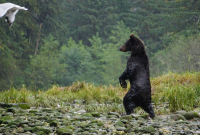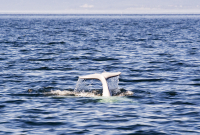Ontario Liberals should do more to protect species, curb climate change impact, commissioner says

Ontario’s environmental commissioner has called on the provincial government to "walk the talk," saying, “It can and should do a better job looking after our forests and wildlife.”
Environmental Commissioner Dianne Saxe issued her office’s annual Environmental Protection Report at Queen's Park Wednesday morning, saying the provincial government needs to do more to address declining moose, bat and amphibian species. Saxe called for stronger efforts to protect endangered species, combat invasive ones and implement better forest fire management techniques.
Moose populations have dropped by 20 per cent in the last decade due to the increase in transportation infrastructure, excessive forest fire suppression and hunting.
But Saxe said the ministry hasn’t done enough to preserve their habitat, strengthen hunting rules for calves, and collect information about their decline.
“Thus, all over the province we see threats to Ontario’s biodiversity that are not being effectively managed by the Ministry of Natural Resources and Forestry. The ministry is being penny-wise and pound-foolish,” Saxe said.
The provincial government recently concluded phase two of the Moose Project, a study that gathered information on moose populations and the factors impacting those populations in Ontario. Other jurisdictions with declining moose populations — parts of Manitoba and Minnesota — have cancelled moose hunts to fight the population decline.
Kathryn McGarry, Ontario's minister of natural resources and forestry, said results from the Moose Project led them to reduce the calf hunting season by two weeks and start the moose hunting season one week later than usual. She said with data coming later this year, they’ll be able to make further changes.
“We’re now in a new era where climate change is a reality and changing some of the habitat areas,” McGarry said.
“We’ll continue to pore through the report and make any other changes moving forward.”

Habitat loss, and fire suppression
Saxe highlighted the need for controlled fires to “bring our boreal forest back into balance.” She said that while the Ministry of Natural Resources has taken positive steps toward addressing these issues, they need to “put words into action.”
The Ontario government spends over $100-million every year on forest fire management and suppression, and McGarry said her government has already “done a lot of the work already that the environment commissioner was looking at.”
“When it comes to prescribed burns, the ministry is already working with forest managers and park staff to make sure that we are doing those prescribed burns. We have to ensure that public safety is at the top of that list," McGarry said.
Species at risk
Eight of Ontario’s 27 species of amphibians are at risk of “being lost from the province” while four of eight bat species are listed as endangered because of a fungal disease known as white noise syndrome.
Ontario’s Invasive Species act, the first-of-its-kind standalone invasive species legislation, comes into effect Nov.. 3, 2016. Minister of Natural Resources and Forestry Kathryn McGarry said the government has identified 16 invasive species to address when the act comes into force, including the Asian carp identified in the commissioner’s report.
Impacts of climate change
Ontario’s Minister of Environment and Climate Change Glen Murray told reporters following the press conference that the work the environmental commissioner does with the government to address the impacts of climate change on the North is extremely important.
The World Meteorological Organization, a United Nations agency that monitors weather, climate and the water cycle, announced last week that the planet has officially passed an historic milestone in atmospheric carbon dioxide concentration — 400 parts per million — and that we are in a new era of "climate change reality." That means the planet is now locked-in to a 1.5 degrees Celsius temperature increase, and temperatures in Northern Ontario are projected to increase by four to eight degrees Celsius over the next several decades.
NASA's top climate scientist Gavin Schmidt told National Observer earlier this week that the global changes underway actually means that the sky is falling since carbon pollution is causing the atmosphere to shrink.
Climate change will also steepen the moose population’s decline. The report suggests that climate change will contribute to moose decline in southern Ontario due to "higher parasite loads, increased predation, heat stress and decreased nutrition. Murray said climate change will bring a host of problems for northern Ontario.
“The impacts that has for trees, methane release, impacts on a whole host of species and ecosystems, on the Great Lakes — which are the fasts growing body of water in the world right now. We are going to have a very large challenge managing and understanding those changes, and intervening in those ecosystems,” Murray said.
Saxe’s report also highlights endangered species like feral wild pigs and zebra mussels, which can disrupt or destroy whole ecosystems. The provincial government spends more than $75-million per year addressing the impact of zebra mussels, which clog pipes at water treatment plants and power generation stations on the Great Lakes.
Saxe gave the government high marks for passing a new invasive species act last year, but wonders if it will work because "most of the hard front-line work is still left to municipalities, conservation authorities and private landowners."
-With files from the Canadian Press.





Comments
Moratorium on Green Energy wind and solar projects.
Multi-millions cost of relocated gas plant debacle.
Hundreds of millions of dollars to natural gas companies in subsidies, but rural Ontario is tithed to Hydro One's "Sunshine List" expenses.
Disinterest by OMOE to petroleum products pipeline contamination of Ontario wetlands and watercourses. (Federal NEB jurisdiction).
Cancellation of spring bear hunt without corroborating evidence, then its reinstatement for Liberal brownie points.
Allowable tree clear cutting lands by farmers, while occasional tree cutting fined under toothless tree cutting bylaws for the average Joe.
The Wynne government is out of touch with the realities of the 21st Century.
Saxe did a great job while an environmental lawyer in private practice. She needs to put some bite into her bark against the current government's ideologies and practices.
Does she still want farmers to pay the road tax on farm (dyed) diesel fuel?
Farmers Feed Cities!
In fall 2016, the Environmental Commissioner of Ontario, Dr. Dianne Saxe, will release her first Greenhouse Gas Progress Report as Commissioner. Come to the Trenton Woodlot Conference and hear her talk about Ontario government progress reducing greenhouse gas emissions, and adapting the province to a new climate. Dr. Dianne Saxe, the keynote speaker at the conference, is a highly respected environmental lawyer. She is now a watchdog over Ontario's environmental, energy and climate performance, and guardian of the Environmental Bill of Rights, 1993 (EBR).
27th Trenton Woodlot Conference
Adapting to a Changing Climate
Friday, November 25, 8 a.m. - 4 p.m.
Batawa Community Centre, 81 Plant Street, Batawa, ON
Hosted by the Hastings Stewardship Council
Admission : $35 includes hot lunch
Register :
Online at hastingsstewardship.ca
Telephone 613-391-9034
Email info@hastingsstewardship.ca